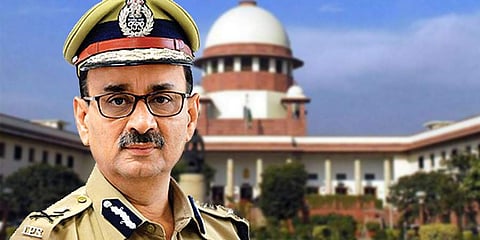

NEW DELHI: CBI Director Alok Verma, who has been divested of all duties by the Centre and sent on leave, told the Supreme Court on Thursday that he was appointed for a fixed tenure of two years and cannot even be transferred.
Verma, who has a feud with his deputy Rakesh Asthana, Special Director in CBI, had approached the apex court seeking a stay on the Centre's order contending that it was against the guidelines laid down by the top court.
During the hearing, the apex court made it clear that it was not going into the allegations and counter allegations. "We are and only testing the issue as a pure question of law," said a bench headed by Chief Justice Ranjan Gogoi.
Challenging the government's decision, Verma's counsel and senior advocate Fali S Nariman said the CBI Director was appointed on February 1, 2017, and "the position of law is that there will be a fixed tenure of two years and this gentleman cannot be even transferred".
Making his submission before the bench, also comprising Justices S K Kaul and K M Joseph, Nariman said there was no basis for the Central Vigilance Commission to pass an order recommending that Verma is sent on leave.
"There has to be a strict interpretation of the Vineet Narain judgment. This is not the transfer and Verma has been denuded of his power and duties. Otherwise, there was no use of the Narain judgement and the law," Nariman said.
The Vineet Narain decision, delivered by the apex court in 1997, relates to the investigation of allegations of corruption against high-ranking public officials in India.
Before 1997, the tenure of the CBI directors was not fixed and they could be removed by the government in any manner.
But the apex court in the Vineet Narain judgment fixed a tenure of a minimum of two years for the CBI director to allow the officer to work with independence.
Nariman referred to the terms and conditions of appointment and removal of the CBI director and concerned provisions of the Delhi Special Police Establishment (DSPE) Act, 1946.
The final authority in appointing a CBI director is the Central government, Attorney General K K Venugopal told the apex court bench. “The committee selects a group of candidates for the appointment of a director of CBI and puts it up before the government. Then, it is the government which appoints the right candidate, out of these,” Venugopal was quoted as saying by the Hindustan Times.
He opposed the plea of Verma and others that the government should have gone back to the selection panel for divesting the CBI Director of his duties and sending him on leave.
Venugopal told the court that Verma is in Delhi living in the same house and hence there is nothing to construe that he has been transferred.
"Verma continues to hold the status of Director, and enjoys all privileges and benefits of the post till date," the AG told the bench which adjourned the hearing for December 5.
The top court also asked CBI to keep a record of all transfers made after Verma was divested of his duties.
"Senior advocate Dushyant Dave, appearing for NGO Common Cause which has come in support of Verma, said that even if a person is facing the corruption charges the issues like transfer of the CBI director have to go before the selection panel comprising the Prime Minister, Leader of Opposition and the CJI.
The process under Delhi Special Police Establishment (DSPE) Act has been bypassed by divesting Alok Verma of charges, Dave said.
Senior advocate Indira Jaising, representing Manish Kumar Sinha, CBI DIG, who was also transferred from the headquarter to Nagpur, said the petition against transfer is kept pending till a decision on the CBI director's plea.
Sinha was also part of the CBI team which was investigating the alleged corruption case against Asthana and others pertaining to meat exporter Moin Qureshi.
Senior advocate Rajeev Dhavan, who appeared for Deputy SP A K Bassi, who was transferred to Port Bair, also advanced his submissions and said, "Even if the court were to say there is a lacuna in the DSPE Act, it is for the Supreme Court to fill up that lacuna. Government or CVC can't fill up this lacuna".
At the outset, Nariman told the bench, which on November 20 had expressed deep anguish over the purported leak of CBI Director's response to the CVC's findings against him, that the court cannot prohibit the publication and referred to the apex court 2012 judgement in a case on the issue.
The bench was also irked over the publication of allegations levelled by agency's DIG Manish Kumar Sinha in his separate plea.